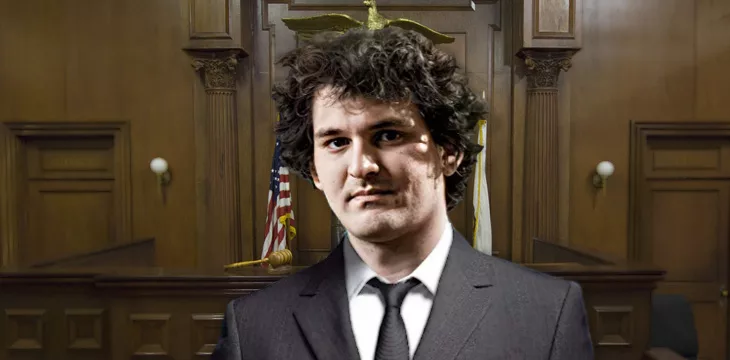As predicted, Sam Bankman-Fried’s decision to testify on his own behalf seems the worst way of convincing a jury he’s not guilty of the federal charges stemming from FTX’s downfall.
Last Thursday, federal prosecutors rested their case against SBF, who’s facing charges of wire/securities/commodities fraud and money laundering conspiracy related to the
November 2022 collapse of the FTX digital asset exchange, its affiliated market-maker
Alameda Research, and countless other companies, as well as the loss of billions in FTX customer funds.
According to the reliable live-tweeting thumbs of Inner City Press, the first action SBF’s team took Thursday was a Hail Mary motion to dismiss all charges against their client based on their claim that prosecutors had failed to make their case. To no one’s surprise, the motion was swiftly dismissed by U.S. District Judge Lewis Kaplan.
Before the main event, SBF’s team called two witnesses, including Bahamian attorney Krystal Rolle, who testified that SBF’s November 2022 post-bankruptcy decision to transfer FTX assets to Bahamian regulators was done at their request/demand and wasn’t an effort to block U.S. authorities from assuming control.
Before SBF’s team could bring their client to the stand, Kaplan dismissed the jury from the Manhattan court for the day. Kaplan took this step to conduct what amounted to a dress rehearsal of SBF’s testimony so that Kaplan could determine whether prosecutors were right that certain aspects of SBF’s defense—specifically, how much he relied on the advice of his attorneys—shouldn’t be heard by the jury.
Under direct examination by his attorneys, SBF worked hard to present a scenario in which many of his decisions—including the taking of billions in loans from Alameda/FTX funds—were guided by decisions made and documents crafted by attorneys such as Daniel Friedberg, Can Sun, and others. SBF also blamed FTX attorneys for his decision to set hundreds of his internal communication groups to auto-delete messages within a week.
SBF claimed that his understanding was that FTX’s terms of service—which SBF later admitted he “skimmed” but never read fully—allowed Alameda to ‘borrow’ FTX customer funds to cover its own shortfalls.
More than once, SBF couldn’t help himself from offering testimony that his lawyers didn’t want him to present. He apparently went off script by mentioning the post-bankruptcy ‘hack’ of FTX customer assets only to have his attorneys shush him and quickly move on to a line of inquiry they wanted him to discuss.
Putting the ‘cross’ in cross-examination
When Assistant U.S. Attorney Danielle Sassoon got her chance to cross-examine SBF, his clear and concise answers vanished, replaced by the formless word salads the world got to know during SBF’s ill-advised post-bankruptcy press tour. SBF’s meandering mouth prompted an unimpressed Kaplan to observe that SBF “has an interesting way of responding to questions.”
When SBF did answer Sassoon’s questions directly, it usually involved some variation of ‘I don’t remember’ or ‘I don’t recall.’ An exasperated Sassoon responded to one of these answers thusly: “So what do you recall?”
SBF’s penchant for assuming he’s the smartest guy in the room was on full display when he questioned the admissibility of a particular Sassoon question. Kaplan intervened, telling SBF to focus on answering and let the judge worry about admissibility issues.
Things took a comical turn when Sassoon asked him whether he believed that he “should not embezzle assets?” SBF’s attorney Mark Cohen objected, and Kaplan sustained, but SBF answered ‘no’ anyway. A frustrated Cohen admonished his client, saying: “You don’t have to answer after sustained. Haven’t you been here for four weeks?”
When SBF tried to claim that auto-delete was only used in ‘personal’ group chats, Sassoon wondered why his definition of ‘personal’ included the seven bogus balance sheets of Alameda assets that Alameda’s ex-CEO Caroline Ellison prepared when digital asset lending platform Genesis Global Capital asked about Alameda’s fiscal health. (SBF eventually picked the most favorable one to send to Genesis so they wouldn’t call in their loans to Alameda.)
Sassoon’s cross-examination closed on a spicy note when she addressed SBF’s decision to hire Friedberg as FTX/Alameda attorney. Asked whether he knew at the time that Friedberg had presided over the fraudulent coverup of an insider cheating scandal at the Ultimate Bet poker site, SBF said he did, but he wanted a general counsel “who was comfortable with reasonable risks.”
Sassoon then pivoted to a truly unexpected question: “Were you aware that Dan Friedberg used illegal narcotics…” Before he could answer, SBF’s attorneys objected, and Kaplan sustained the objection, offering a mild rebuke of Sassoon, who wrapped up her questioning then and there.
With SBF dismissed, Kaplan and the attorneys discussed how much of the ‘advice of counsel’ defense would be permitted when the jury returned on Friday. Kaplan tipped his hand by saying he found this line of defense “dubious” but said he’d give his final answer in the morning.
Enter the jury
On Friday, before the jury was recalled, Kaplan said the only ‘advice of counsel’ defense he’d allow would pertain to FTX/Alameda’s document retention policy, and allowing other instances would be “confusing and prejudicial.” With that, the jury was ushered in, and Thursday’s action was replayed, this time for all the marbles.
Suffice it to say, SBF ended the day almost out of marbles. And this was despite his lawyers’ taking the entire day on their direct examination, with more to come on Monday. Prosecutors will finally get their chance to put SBF in front of a jury later that day, but it may not matter anymore.
Asked directly by his attorney whether he defrauded anyone, SBF stated: “No, I did not.” Asked whether he took FTX customer funds, SBF answered, “No.” But even under direct examination by his own attorneys, SBF couldn’t help serving up more word salads.
As on Thursday, Kaplan felt the need to repeatedly intervene, telling SBF to “stop talking” and shutting down his efforts to provide his own definitions for things like ‘market manipulation’ to the jury.
SBF’s inability to speak plainly stood in stark contrast to the clear and direct answers that his former colleagues Ellison, Nishad Singh, and Zixiao ‘Gary’ Wang provided during their time in the witness box. All three-fingered SBF as the ultimate decision maker behind FTX/Alameda’s criminal activities.
SBF’s efforts to ‘pin the blame on (insert name here)’ included lamenting that one of his biggest mistakes was not hiring a dedicated risk management team, instead leaving such matters to Ellison and others like Sam Trabucco. Then again, since SBF also consciously opted against hiring a CFO or establishing a board of directors, this is the bed he made.
SBF feigned ignorance when it came to the special privileges that Alameda enjoyed on FTX, including the aforementioned borrowing of billions of FTX customers’ cash and the refusal to liquidate Alameda’s account when it was deep in the red. He also repeated his claim that he had no idea that Alameda’s dipping into FTX accounts had created an $8 billion hole at the time of FTX’s collapse.
SBF did offer a few eyebrow-raising claims, including that he’d always planned to sell FTX to rival Binance, whose founder Changpeng ‘CZ’ Zhao held a 20% stake until mid-2021, when FTX bought him out for $2.1 billion. Publicly, at least, CZ briefly considered acquiring FTX shortly before its bankruptcy but backed out a day later, reportedly after discovering the true extent of its fiscal folly.
SBF also revealed that during his mid-2022 period, where he was pretending to be the white knight of ‘crypto’ by appearing to bail out other struggling firms—in reality, he wanted to acquire their assets to help plug the holes in FTX—he declined an appeal from Digital Currency Group (DCG) boss Barry Silbert to bail out his Genesis lending operation. SBF also turned down a bailout request from struggling lender Celsius. Both Genesis and Celsius later filed for bankruptcy.
Assuming the defense team is indeed over by mid-Monday, prosecutors told Kaplan that they believe their cross-examination will spill over into Tuesday, after which both sides will make their closing arguments. The jury won’t likely get their final instructions from Kaplan to begin deliberations until Friday or possibly next Monday (Nov. 6).
Once the jury has rendered its verdict, Kaplan will take some time to consider what sentence to impose on SBF. The Wall Street Journal reported Friday that SBF’s former colleagues—who reached deals with prosecutors on their own charges and agreed to cooperate in the hope of lessening their own sentences—will learn their fate at the same time as SBF. Worst. Christmas. Ever.
Follow CoinGeek’s Crypto Crime Cartel series, which delves into the stream of group—from BitMEX to Binance, Bitcoin.com, Blockstream, ShapeShift, Coinbase, Ripple,
Ethereum, FTX and Tether—who have co-opted the digital asset revolution and turned the industry into a minefield for naïve (and even experienced) players in the market.
New to blockchain? Check out CoinGeek’s Blockchain for Beginners section, the ultimate resource guide to learn more about blockchain technology.









